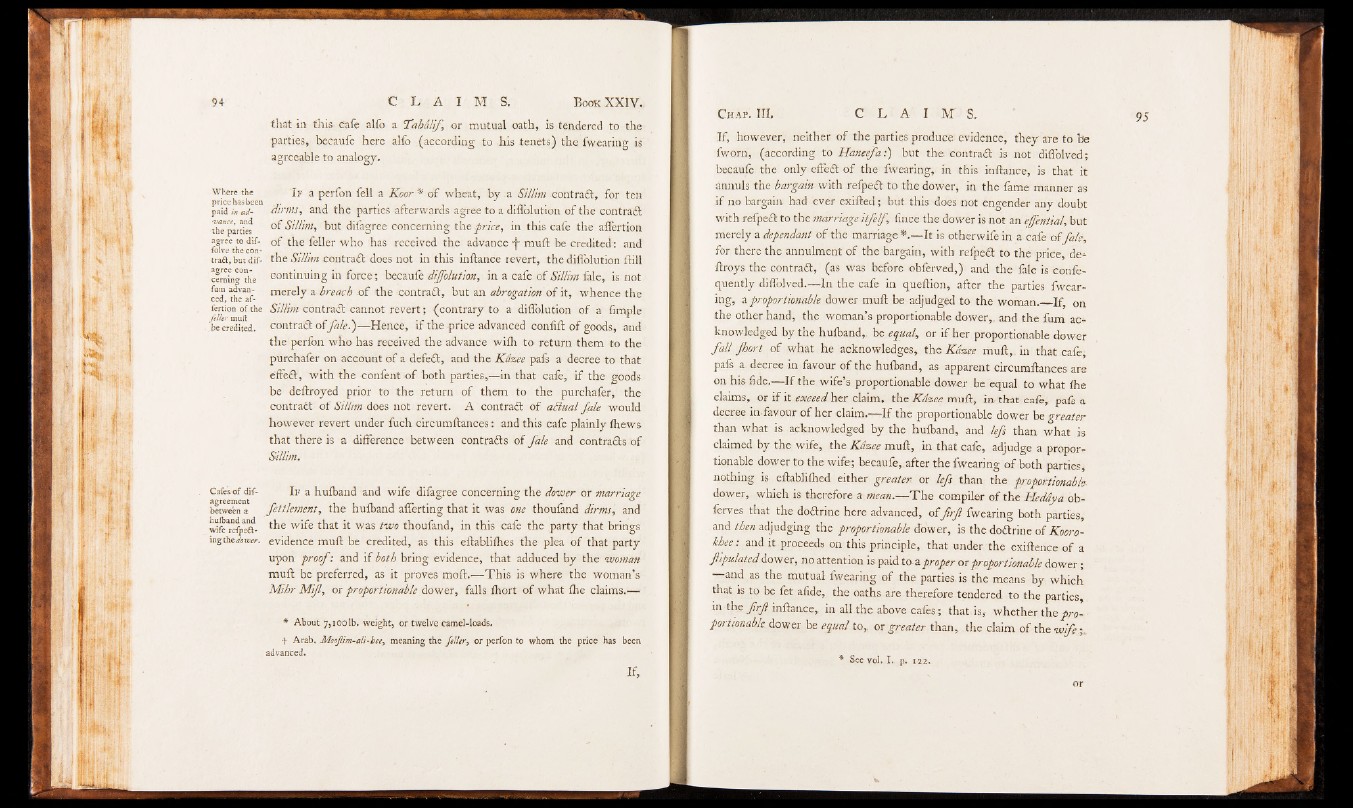
94 C L A I M S , Book XXIV.
that in this crafe alfo a Kahalif, or mutual oath, is tendered to the
parties, becaufe here alfo (according to his tenets) the fwearing is
agreeable to analogy.
i l l !
Where the
price has been
paid in ad-
<vance, and
the parties
agree to dif-
folve the con-
trad, but disagree
concerning
the
fum advanced,
the af-
fertion of. the
feller muft
be credited.
If a perfon fell a Koor* of wheat, by a Sillim contrail, for ten
dirms, and the parties afterwards agree to a diffolution of the contraft
of Sillim, but difagree concerning the .price, in this cafe the affertion
of the feller who has received the advance j- muft be credited': and
the Sillim contra £t does not in this inftance revert, the diflolution ftill
continuing in force; becaufe diffolution, in a cafe of Sillim fale, is not
merely a breach of the -contraft, but an abrogation of it, whence the
Sillim contract cannot revert; (contrary to a diffolution of a Ample
contract of fale.')— Hence, if the price advanced conlift of goods, and
the perfon who has received the advance with to return them to the
purchafer on account of a defett, and the Kdzee pafs a decree to that
effeft, with the confent o f both parties,—in that cafe, if the goods
be deftroyed prior to the return of them to the purchafer, the
contract of Sillim does not revert. A contradt of atlual fale would
however revert under fuch circumftances: and this cafe plainly (hews
that there is a difference between contracts of fale and contracts of
Sillim.
Cafekof dif- If a hulband and wife difagree concerning the dower or marriage
bewe?n a* fettlement, the hulband afferting that it was one thoufand dirms, and
wdfe rrfpcä t^e wife that it was two thoufand, in this cafe the party that brings
ingthedower. evidence muft be credited, as this eftablilhes the plea of that party
upon proof: and if both bring evidence, that adduced by the woman
muft be preferred, as it proves moft.—This is where the woman’s
Mihr Miß, or proportionable dower, falls Ihort of what Ihe claims.—
* About 7, i oo lb. weight, or twelve camel-loads.
t Arab. Moojlim-ali- beey meaning the feller, or perfon to whom the price has been
advanced.
if,
OH
If, however, neither of the parties produce evidence, they are to be
fworn, (according to Haneefa:) but the contract is not diffolved;
becaufe the only effedt of the fwearing, in this inftance, is that it
annuls the bargain with refpeft to the dower, in the fame manner as
if no bargain had ever exifted; but this doés not engender any doubt
with refpect to the marriage itfelf, fince the dower is not an ejfential, but
merely a dependant of the marriage * .— It is other wife in a-cafe offale,
for there the annulment of the bargain, with refpedt to the price, de-
ftroys the contradt, (as was before obferved,) and the fale is confe-
quently diffolved.— In the cafe in queftion, after the parties fwearing,
a proportionable dower muft be adjudged to the woman.— If, on
the other hand, the woman’s proportionable dower,, and the fum acknowledged
by the hulband, be equal, or i f her proportionable dower
fa ll Jhort of what he acknowledges* the Kdzee muft,, in that cafe;
pafs a decree in favour of the hulband, as apparent circumftances are
on his fide,— I f the wife’s proportionable dower be equal to what Ihe
claims, or if it exceed her claim, the Kdzee muft, in that cafe, pafs a
decree in-favour of her claim.— I f the proportionable dower be greater
than what is acknowledged by the hulband, and lefs than what is
claimed by the wife, the Kdzee muft, in that cafe, adjudge a proportionable
dower to the wife; becaufe, after the fwearing of both parties,
nothing is eftablilhed either greater or lefs than the proportionable.
dower, which is therefore a mean.— T h e compiler of the Heddya ob-
ferves that the doftrine here advanced, offirfi fwearing both parties,
and then adjudging the proportionable dower, is the doftrine of Kooro-
khee: and it proceeds on this principle, that under the exiftence of a
fipulated dower, no attention is paid toa proper ox proportionable dower;
— and as the mutual fwearing o f the parties, is the means by which
that is to be fet afide, the oaths are therefore tendered to the parties*
in the fir jl inftance, in all the above cafes; that, is, whether the pro-
portionable dower be equal to,, or greater than, the claim of the wife ;~
* See vol. I. p. i22.
1 I f
il # 1 8